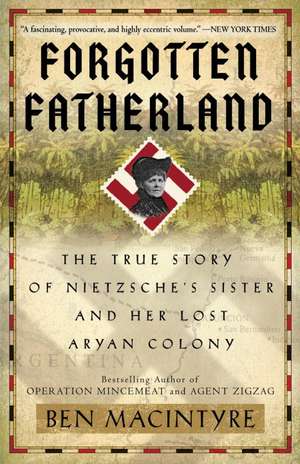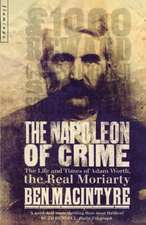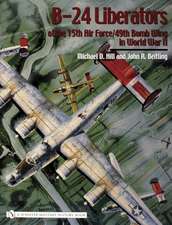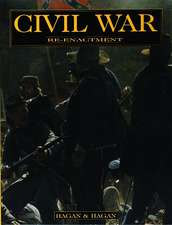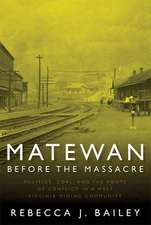Forgotten Fatherland: The True Story of Nietzsche's Sister and Her Lost Aryan Colony
Autor Ben MacIntyreen Limba Engleză Paperback – 31 mar 2011
| Toate formatele și edițiile | Preț | Express |
|---|---|---|
| Paperback (2) | 80.18 lei 6-8 săpt. | |
| BROADWAY BOOKS – 31 mar 2011 | 112.52 lei 3-5 săpt. | |
| Bloomsbury Publishing – 13 mar 2013 | 80.18 lei 6-8 săpt. |
Preț: 112.52 lei
Nou
Puncte Express: 169
Preț estimativ în valută:
21.53€ • 23.38$ • 18.09£
21.53€ • 23.38$ • 18.09£
Carte disponibilă
Livrare economică 01-15 aprilie
Preluare comenzi: 021 569.72.76
Specificații
ISBN-13: 9780307886446
ISBN-10: 0307886441
Pagini: 283
Dimensiuni: 132 x 202 x 18 mm
Greutate: 0.25 kg
Editura: BROADWAY BOOKS
ISBN-10: 0307886441
Pagini: 283
Dimensiuni: 132 x 202 x 18 mm
Greutate: 0.25 kg
Editura: BROADWAY BOOKS
Notă biografică
BEN MACINTYRE is a writer-at-large and associate editor of the Times of London and bestselling author of Operation Mincemeat, Agent Zigzag, and The Napoleon of Crime, among other books. He lives in London with his wife, the novelist Kate Muir, and their three children.
Extras
Chapter One: Asunción Docks, Paraguay, 15 March 1886
Late in the afternoon the little Montevideo steamer docked at the decrepit quay below the Plaza del Palma, and fourteen families of sweating, travel-weary German immigrants climbed unsteadily down the gangplank into Paraguay. People said later it was the hottest day that year.
Their leader was immediately identifiable. A tall, gaunt man with emphatic eyebrows and a thick spade beard which started high on his cheekbones and jutted straight out from his face. His mouth was almost entirely concealed behind a bushy carpet of hair. He wore, as always, a tight frock coat with an Iron Cross pinned on the lapel, and his booming voice and fierce manner gave him the air of an avenging prophet; which is exactly what he thought he was. His name was Koktor Bernhard Förster of Charlottenburg, and he was in the Utopia-building business.
The wife Elisabeth was equally conspicuous. A small, restless woman with her hair tied back in a tight bun, and topped with a lace bonnet. She was dressed in black, as formal and severe as her husband, and seemed oblivious of the heat. At thirty-nine years old she was still beautiful, her face round and unlined with a slightly snubbed nose, though her looks had always been marred by a squint. One piercing black eye looked directly ahead, while the other seemed to focus on something several feet to the right. In German they called it a “Silberlick” or silver view. Ever her best friends used to say that the effect at close quarters, through her pince-nez, was thoroughly unnerving. She had been born Elisabeth Nietzsche, the second child of a Lutheran pastor from Saxony, and the sister of an eccentric, and as yet quite unknown, German philosopher, Friedrich Nietzsche.
Elisabeth, although she considered herself to be cosmopolitan, had seldom set foot outside Germany, and never outside Europe. Until her marriage to Bernhard Förster, less than a year earlier, she had lived a sheltered bourgeois life with her mother in a small house in Naumberg. Yet of the hundred or so Germans who disembarked at Asunción docks in the heat of that March afternoon, it was Elisabeth who was probably the least put out by her new surroundings. Her penetrating voice, with the provincial Saxon accent she had tried but never been able to conceal, grew shrill as a gang of mulatto peons clumsily maneuvered her large piano down the gangplank.
Asunción in 1886 cannot have been a welcoming sight. Much of the city was still in ruins after the War of the Triple Allicance, an unwinnable blood-bath waged by Paraguay against three far more powerful neighbors. The years of carnage had left three-quarters of the male population dead, and the countryside devastated by famine and disease. The skyline above the port was still dominated by the half-built edifice of the Presidential Palace. This was to have been the imperial seat of Francisco Solano Lopez, the country’s war-hungry President, and a symbol of Paraguay’s military power. He had died an ignominious death in the last battle of the war and building had stopped abruptly; now there was neither the money nor the manpower to finish it. It loomed, a rotting testament to the dictator’s vanity.
If some of the German settlers stared in understandable horror at the crumbling, malodorous remains of the Paraguayan capital, Elisabeth and Bernhard Förster certainly did not. They were, by nature, a couple immune to second thoughts. Paraguay was to be the setting for the most glorious moment of their lives, the culmination of a dream no less grandiose and hopeless than the one which had inspired the dictator Lopez to model himself on Napoleon. Berhard Förster was by inclination, indeed by profession, an anti-Semite who, like another of his type fifty years later, sought to build an empire out of race hatred; Elisabeth Nietzsche was a willing accomplice—to both of them, as it turned out. A few European settlers had come to Paraguary before, impelled by poverty, greed, or adventure. Most, it is true, had perished or disappeared. The Försters’ motivation was both more simple, and more terrible, than any who had preceded them.
Every one of the German men and women who now loaded their few possessions on to ox carts, the great wheeled carretas, and moved with the painful slowness along the quay that had been selected on the basis of their genetic purity, their Aryan racial characteristics. Most were from Saxony, victims of an economic crisis in Germany that had left much of the peasantry landless and nearly destitute; but many also shared the Försters’ ideal of a community cleaned of Jewish influence, of the taint of Jewish capitalism. It was the Jews, they all agreed, who had forced them out of the Fatherland, Förster spoke of Germany as a “step-fatherland,” a place where honest German virtues were being blighted, where culture was at the mercy of Zion. In South America, he said, they could found a New Germany, where Germans would be able to cultivate the genuine German geist, where fruit and vegetables grew in abundance (the Försters were militantly vegetarian,) and where their Lutheran religion could prosper in pristine isolation. New Germany, in the midst of the Paraguayan wilderness, would be the nucleus for a glorious new Fatherland that would one day cover the entire continent.
In 1883 Förster had been sacked from his Berlin teaching post for racist agitation, and had traveled through central South America in search of a suitable site for his colonial project. He had chosen Paraguay, depopulated, fertile, and above all uncontaminated by Jewry. For two years after his return he had peddled his message through the cities and villages of Germany, while Elisabeth Nietzsche distributed his racist pamphlets and collected funds for the venture. In Berlin they had been ridiculed, but in rural Saxony, over foaming biersteins, they had been heard and understood. The Fischer family had been among the first converts, then the Schuberts, who claimed to be of the composer’s family, and the Schuttes, who made musical instruments in Chemnitz. Some agreed to vouchsafe their savings, as a down-payment on the land Förster said he could find at cheap rates, but most had no savings to offer, Förster said it did not matter; they could pay after their first bountiful harvest in the promised land. Fritz Naumann, a young, intelligent artisan, came from Breslau with his family; Oscar Erck, a big-fisted farmer from the south, sold his land to become Förster’s henchman. The number of Förster’s followers grew slowly but steadily; they were a mixed crew, but all claimed pure Aryan ancestry.
There had been a few last minute recruits. Max Stern, for example, a dark-haired carpenter who said he was from Frankfurt, had appeared while they were loading their possessions and families on to the steamer Uruguay in Hamburg harbor. Förster and his wife had welcomed him aboard. “Others will follow,” they promised, as the boar prepared to set sail. Elisabeth was sure that her intellectual brother, whose health, she said, would certainly benefit form the excellent Paraguayan climate, would one day agree to join them, even though he had repeatedly denounced the anti-Semitic venture. Once the colony was established, Förster assured his disciples, thousands would flock to the new Fatherland from the old one where they were “wasting away in sickness and poverty.”
The voyage from Germany had been one of the purest horror: a month at sea on a rotting hulk, alive with cockroaches, awash with vomit, living off weevily biscuits and rancid cheese. They had spent a few days plunged into the bemusing bustled of Montevideo while Doktor Förster arranged their passage, and then five days up the Parana River in a swaying, clanking steamer. At night, animal howls echoed from the dense riverbank undergrowth as the boat churned past; the dark-skinned boathands spoke a language of twittering birds, they mocked the Germans’ discomfort, frightened the children, and spat horribly. At night the mosquitoes had pounced in dense fizzing clouds, and microscopic bugs, which the boathands called “polverinos,” burrowed under their skin and laid tiny yellow eggs which festered at once if scratched. Two days before they reached Asunción, the Fischers’ youngest daughter had suddenly died. At Montevideo she had been pale but talkative; then one night she had vomited blood and started a fever; the next morning she was dead, curled up in a hold next to her sister. They had buried her on one of the few clear patches of riverbank, under a huge tree with red flowers.
That first evening in Paraguay Elisabeth and Bernard Förster checked into the city’s only remaining hotel, while the rest of the immigrants bedded down for the night in makeshift huts next to the customs house, the Aduana, an incongruously grand building and another of the dictator Lopez’s architectural innovations. It had been built so that its lines followed the contours of the steep river bank, and it looked ready to topple into the water at any moment. Across the river the Gran’Chaco stretched away to the west, a vast tangled of sharp undergrowth, tall trees, and deep swamp. It was through this sort of terrain that the settlers would have to travel before they reached the area, about one hundred and fifty miles to the north, that Förster had already christened “New Germany.” The final part of the journey would take at least another week, by boat up the broad Rio Paraguay and then across country, by horse and oxcart.
Förster had already lectured his colonists on the correct attitude: “Despite the many difficulties, the emigrants will know they have partaken in a great project. This mission has a name: the purification and rebirth of the human race, and the preservation of human culture.” Perhaps those words ran through their minds, as the handful of Aryan pioneers sat in the fetid atmosphere of Asunción harbor and waited for another boat to take them upriver.
Late in the afternoon the little Montevideo steamer docked at the decrepit quay below the Plaza del Palma, and fourteen families of sweating, travel-weary German immigrants climbed unsteadily down the gangplank into Paraguay. People said later it was the hottest day that year.
Their leader was immediately identifiable. A tall, gaunt man with emphatic eyebrows and a thick spade beard which started high on his cheekbones and jutted straight out from his face. His mouth was almost entirely concealed behind a bushy carpet of hair. He wore, as always, a tight frock coat with an Iron Cross pinned on the lapel, and his booming voice and fierce manner gave him the air of an avenging prophet; which is exactly what he thought he was. His name was Koktor Bernhard Förster of Charlottenburg, and he was in the Utopia-building business.
The wife Elisabeth was equally conspicuous. A small, restless woman with her hair tied back in a tight bun, and topped with a lace bonnet. She was dressed in black, as formal and severe as her husband, and seemed oblivious of the heat. At thirty-nine years old she was still beautiful, her face round and unlined with a slightly snubbed nose, though her looks had always been marred by a squint. One piercing black eye looked directly ahead, while the other seemed to focus on something several feet to the right. In German they called it a “Silberlick” or silver view. Ever her best friends used to say that the effect at close quarters, through her pince-nez, was thoroughly unnerving. She had been born Elisabeth Nietzsche, the second child of a Lutheran pastor from Saxony, and the sister of an eccentric, and as yet quite unknown, German philosopher, Friedrich Nietzsche.
Elisabeth, although she considered herself to be cosmopolitan, had seldom set foot outside Germany, and never outside Europe. Until her marriage to Bernhard Förster, less than a year earlier, she had lived a sheltered bourgeois life with her mother in a small house in Naumberg. Yet of the hundred or so Germans who disembarked at Asunción docks in the heat of that March afternoon, it was Elisabeth who was probably the least put out by her new surroundings. Her penetrating voice, with the provincial Saxon accent she had tried but never been able to conceal, grew shrill as a gang of mulatto peons clumsily maneuvered her large piano down the gangplank.
Asunción in 1886 cannot have been a welcoming sight. Much of the city was still in ruins after the War of the Triple Allicance, an unwinnable blood-bath waged by Paraguay against three far more powerful neighbors. The years of carnage had left three-quarters of the male population dead, and the countryside devastated by famine and disease. The skyline above the port was still dominated by the half-built edifice of the Presidential Palace. This was to have been the imperial seat of Francisco Solano Lopez, the country’s war-hungry President, and a symbol of Paraguay’s military power. He had died an ignominious death in the last battle of the war and building had stopped abruptly; now there was neither the money nor the manpower to finish it. It loomed, a rotting testament to the dictator’s vanity.
If some of the German settlers stared in understandable horror at the crumbling, malodorous remains of the Paraguayan capital, Elisabeth and Bernhard Förster certainly did not. They were, by nature, a couple immune to second thoughts. Paraguay was to be the setting for the most glorious moment of their lives, the culmination of a dream no less grandiose and hopeless than the one which had inspired the dictator Lopez to model himself on Napoleon. Berhard Förster was by inclination, indeed by profession, an anti-Semite who, like another of his type fifty years later, sought to build an empire out of race hatred; Elisabeth Nietzsche was a willing accomplice—to both of them, as it turned out. A few European settlers had come to Paraguary before, impelled by poverty, greed, or adventure. Most, it is true, had perished or disappeared. The Försters’ motivation was both more simple, and more terrible, than any who had preceded them.
Every one of the German men and women who now loaded their few possessions on to ox carts, the great wheeled carretas, and moved with the painful slowness along the quay that had been selected on the basis of their genetic purity, their Aryan racial characteristics. Most were from Saxony, victims of an economic crisis in Germany that had left much of the peasantry landless and nearly destitute; but many also shared the Försters’ ideal of a community cleaned of Jewish influence, of the taint of Jewish capitalism. It was the Jews, they all agreed, who had forced them out of the Fatherland, Förster spoke of Germany as a “step-fatherland,” a place where honest German virtues were being blighted, where culture was at the mercy of Zion. In South America, he said, they could found a New Germany, where Germans would be able to cultivate the genuine German geist, where fruit and vegetables grew in abundance (the Försters were militantly vegetarian,) and where their Lutheran religion could prosper in pristine isolation. New Germany, in the midst of the Paraguayan wilderness, would be the nucleus for a glorious new Fatherland that would one day cover the entire continent.
In 1883 Förster had been sacked from his Berlin teaching post for racist agitation, and had traveled through central South America in search of a suitable site for his colonial project. He had chosen Paraguay, depopulated, fertile, and above all uncontaminated by Jewry. For two years after his return he had peddled his message through the cities and villages of Germany, while Elisabeth Nietzsche distributed his racist pamphlets and collected funds for the venture. In Berlin they had been ridiculed, but in rural Saxony, over foaming biersteins, they had been heard and understood. The Fischer family had been among the first converts, then the Schuberts, who claimed to be of the composer’s family, and the Schuttes, who made musical instruments in Chemnitz. Some agreed to vouchsafe their savings, as a down-payment on the land Förster said he could find at cheap rates, but most had no savings to offer, Förster said it did not matter; they could pay after their first bountiful harvest in the promised land. Fritz Naumann, a young, intelligent artisan, came from Breslau with his family; Oscar Erck, a big-fisted farmer from the south, sold his land to become Förster’s henchman. The number of Förster’s followers grew slowly but steadily; they were a mixed crew, but all claimed pure Aryan ancestry.
There had been a few last minute recruits. Max Stern, for example, a dark-haired carpenter who said he was from Frankfurt, had appeared while they were loading their possessions and families on to the steamer Uruguay in Hamburg harbor. Förster and his wife had welcomed him aboard. “Others will follow,” they promised, as the boar prepared to set sail. Elisabeth was sure that her intellectual brother, whose health, she said, would certainly benefit form the excellent Paraguayan climate, would one day agree to join them, even though he had repeatedly denounced the anti-Semitic venture. Once the colony was established, Förster assured his disciples, thousands would flock to the new Fatherland from the old one where they were “wasting away in sickness and poverty.”
The voyage from Germany had been one of the purest horror: a month at sea on a rotting hulk, alive with cockroaches, awash with vomit, living off weevily biscuits and rancid cheese. They had spent a few days plunged into the bemusing bustled of Montevideo while Doktor Förster arranged their passage, and then five days up the Parana River in a swaying, clanking steamer. At night, animal howls echoed from the dense riverbank undergrowth as the boat churned past; the dark-skinned boathands spoke a language of twittering birds, they mocked the Germans’ discomfort, frightened the children, and spat horribly. At night the mosquitoes had pounced in dense fizzing clouds, and microscopic bugs, which the boathands called “polverinos,” burrowed under their skin and laid tiny yellow eggs which festered at once if scratched. Two days before they reached Asunción, the Fischers’ youngest daughter had suddenly died. At Montevideo she had been pale but talkative; then one night she had vomited blood and started a fever; the next morning she was dead, curled up in a hold next to her sister. They had buried her on one of the few clear patches of riverbank, under a huge tree with red flowers.
That first evening in Paraguay Elisabeth and Bernard Förster checked into the city’s only remaining hotel, while the rest of the immigrants bedded down for the night in makeshift huts next to the customs house, the Aduana, an incongruously grand building and another of the dictator Lopez’s architectural innovations. It had been built so that its lines followed the contours of the steep river bank, and it looked ready to topple into the water at any moment. Across the river the Gran’Chaco stretched away to the west, a vast tangled of sharp undergrowth, tall trees, and deep swamp. It was through this sort of terrain that the settlers would have to travel before they reached the area, about one hundred and fifty miles to the north, that Förster had already christened “New Germany.” The final part of the journey would take at least another week, by boat up the broad Rio Paraguay and then across country, by horse and oxcart.
Förster had already lectured his colonists on the correct attitude: “Despite the many difficulties, the emigrants will know they have partaken in a great project. This mission has a name: the purification and rebirth of the human race, and the preservation of human culture.” Perhaps those words ran through their minds, as the handful of Aryan pioneers sat in the fetid atmosphere of Asunción harbor and waited for another boat to take them upriver.
Recenzii
“A fascinating, provocative, and highly eccentric volume that is part biography, part travelogue, part detective story.”
—New York Times
“Witty, intelligent, and told with rollicking, trenchant style.”
—Boston Globe
“A hoot of a book.”
—Washington Post Book World
“A black-comic stylist who never misses an opportunity for a malicious aside.”
—Newsday
“A sparkling idea, and its realization...yields vivid travel writing and information of a ghostly but fascinating sort.”
—The New Yorker
“Absorbing and highly readable....Since the collapse of Easy Germany in 1989, the Nietzsche papers have become more accessible. Mr. Macintyre has made excellent use of them in reconstructing the story of this formidable woman.”
—New York Times Book Review
“Enjoyable and informative.”
—New York Review of Books
“Macintyre's journey and his descriptions of what he found make compelling reading. But more fascinating still is the story Macintyre interweaves with his discovery of Nueva Germania, that of Elisabeth's own life, and her deliberate distortions of her brother's philosophy to make it accord with her own.”
—The Sunday Times [UK]
“In 1886, Bernard Forster and Elisabeth Nietzsche arrived in Paraguay with a boatload of German peasants...The venture failed, but what became of the colony? Ben Macintyre set off to find out.”
—The Sunday Telegraph [London]
“Engaging and entertaining...Forgotten Fatherland weaves together a number of curious and disparate strands, and makes new use of the Nietzsche archive in Weimar.”
—The Times Literary Supplement
“Lurid and delightful: Rider Haggard couldn’t ask for more.”
—Kirkus Reviews
“[A] brilliant piece of investigative journalism.”
—Publishers Weekly
—New York Times
“Witty, intelligent, and told with rollicking, trenchant style.”
—Boston Globe
“A hoot of a book.”
—Washington Post Book World
“A black-comic stylist who never misses an opportunity for a malicious aside.”
—Newsday
“A sparkling idea, and its realization...yields vivid travel writing and information of a ghostly but fascinating sort.”
—The New Yorker
“Absorbing and highly readable....Since the collapse of Easy Germany in 1989, the Nietzsche papers have become more accessible. Mr. Macintyre has made excellent use of them in reconstructing the story of this formidable woman.”
—New York Times Book Review
“Enjoyable and informative.”
—New York Review of Books
“Macintyre's journey and his descriptions of what he found make compelling reading. But more fascinating still is the story Macintyre interweaves with his discovery of Nueva Germania, that of Elisabeth's own life, and her deliberate distortions of her brother's philosophy to make it accord with her own.”
—The Sunday Times [UK]
“In 1886, Bernard Forster and Elisabeth Nietzsche arrived in Paraguay with a boatload of German peasants...The venture failed, but what became of the colony? Ben Macintyre set off to find out.”
—The Sunday Telegraph [London]
“Engaging and entertaining...Forgotten Fatherland weaves together a number of curious and disparate strands, and makes new use of the Nietzsche archive in Weimar.”
—The Times Literary Supplement
“Lurid and delightful: Rider Haggard couldn’t ask for more.”
—Kirkus Reviews
“[A] brilliant piece of investigative journalism.”
—Publishers Weekly
Descriere
From the bestselling author of "Operation Mincemeat" and "Agent Zigzag" comes the fascinating story of Elisabeth Nietzsche--sister of the famed philosopher--and her insane attempt to found a utopian colony in the jungles of Paraguay in the late 19th century.
Caracteristici
Reissued in the brilliant branded look we have for Ben Macintyre's paperbacks
